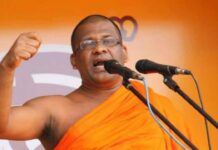The Saudi regime is seeking the death penalty for prominent dissident scholar Salman al-Awdah on terrorism charges, his family members have said on Tuesday.
The 37 charges against the 61-year-old preacher in the Specialised Criminal Court include spreading discord and incitement against the ruler, according to London-based Saudi human rights group, ALQST.
Shaykh al-Awdah’s son, Abdullah, confirmed the court proceedings and said the accusations against his father included tweets criticising the regime and establishing a group in Kuwait for defending the Prophet Muhammad.
Amnesty International’s Saudi campaigner Dana Ahmed described the reports “a disturbing trend in the Kingdom that sends a horrifying message that peaceful dissent and expression may be met with the death penalty.”
A government communications office did not immediately respond to a request for comment.
Saudi Arabia, an absolute monarchy where public protests and political parties are banned, has witnessed a crackdown on dissent, with scores of scholars, intellectuals and activists arrested in the past year.
Shaykh al-Awdah, whom UN experts have described as a “reformist” and an influential religious figure who has pushed for greater respect for human rights within Saudi, was arrested last September.
Subscribe to our newsletter and stay updated on the latest news and updates from around the Muslim world!
He had previously criticised the Saudi regime but more recently kept silent or failed to publicly support Saudi policies, including the boycott of Qatar over their support for the Muslim Brotherhood and the war in Yemen.
The Al Saud family has always regarded Islamic political group and movements the biggest internal threat to its rule.
In the 1990s, the Muslim Brotherhood-inspired Sahwa (Awakening) movement demanded political reforms that would have weakened the ruling family.
Shaykh al-Awdah, who was a Sahwa leader, was imprisoned from 1994-1999 for calling for political change.
The authorities recommended the death penalty last month for five human rights activists from the kingdom’s Eastern Province, including Israa al-Ghomgham, the first woman to possibly face that punishment for rights-related work.




















